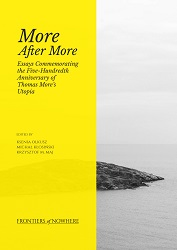
We kindly inform you that, as long as the subject affiliation of our 300.000+ articles is in progress, you might get unsufficient or no results on your third level or second level search. In this case, please broaden your search criteria.

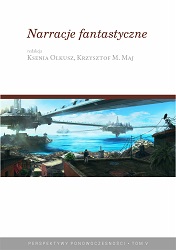
Periods of brinkmanship and crisis encourage the rise of apocalyptical thinking in modern society.The second half of the twentieth century witnessed the rapid development of post-apocalyptic fiction, whose authors examined the human condition in the face of extinction. The development of nuclear weapons and the subsequent dropping of the atom bomb on Hiroshima became of the inspiration of numerous comic book writers to exploit nuclear war anxieties of societies still reeling from the carnage of World War II. Furthermore, comic books became a forum for the presentation of social, political and philosophical discourses. The aim of Wojciech Lewandowski’s chapter is to present, accordingly, an exposition on comics, as media, are capable visionaries of complex philosophical discourses. Another vector is the graphic novel that presents a forum to communicate political ideas without being perceived as a propaganda tool. The presentation of political ideas occurs explicitly in the textual sphere. Furthermore, they can be presented in more sublte ways by the use of symbols that are presented in the visual layer. It is therefore, the capabilities of political discourse that have led me to research the graphic novel, "V for Vendetta". In "V for Vendetta", author’s Alan Moore and David Lloyd, write of a dystopian post-apocalyptic Great Britain. Through the fictional dystopian narrative of the plot one can discern its great potential as a forum of social and political discussion on the contemporary problems of the real-world.
More...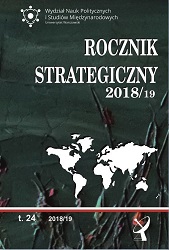

In the last dozen months we have seen a spectacular comeback of power politicsin international relations. It is partially caused by a crisis of democracy and of theinternational liberal order as well as by an increase of unilateralism in the policy ofbig states. At the same time, we note a peculiar pandemic of a petty tyrant type ofpoliticians who are power hungry and ready to change the political system of theircountry in order to extend their rule indefinitely. The trend has been accompanied bya dramatic decrease of moral standards in international politics. The trend of powerpolitics has been dictated by the US administration and enthusiastically followedby Russia and China, which feel in their natural element in it. The same has beennoted in the policy of a number of mid-size powers. The Middle East seems tobe a regional laboratory of this tendency, with the dangerous example of Saudi--Iranian confrontation. The new global political context means the risk of furthermarginalization of the European Union. Additionally, internal problems made theUnion even weaker. Macron’s and Merkel’s position has been put into question andturbulent Brexit damaged the energy and image of both the UK and the Community.Poland’s policy, marked by the rise of centrifugal nationalistic political forces, looksmore like part of the problem than the solution of the troubling European situation.
More...
In 2018, the world’s arms control architecture teetered on the brink of collapse.The paper presents some examples of this process: 1. the United States withdrewfrom the Iran nuclear deal (P5 + 1 – Iran); 2. the summit in Singapore was important,but negotiations between the United States and North Korea over Pyongyang’snuclear programme and denuclearization of the Korean Peninsula stalled; 3. the newSTART was correctly implemented but its future is uncertain; 4. the US threatenedto withdraw from the INF.
More...
The paper presents an overview of the changes in the global economy since 2017.Consecutive sections deal with the analysis of economic indicators and challengesfaced by Global Economic Governance in its particular dimensions: trade, finance,and development. In spite of a moderately positive condition of the global economyin the last two years, the current situation cannot be considered as fully stable. Thisapplies both to economic output and the future of the global economic order. Inevery dimension of Global Economic Governance, there is a significant rift betweenthe efforts to promote multilateral solutions and individual actions taken by somestates. In case of the global trade system, the major concern constitute the risingprotectionism and the threat of trade conflicts, as well as the growing dysfunctionof the World Trade Organization (WTO). The recurring issue for global financialsystem remains its reform. In terms of global development cooperation, progresshas been made towards eliminating poverty, yet simultaneously income inequalitiesare on the rise. Moreover, in spite of the ongoing reform of development finance,the current system is incapable of meeting the needs of sustainable development andinclusive growth.
More...
2018 was a year of substantial internal reconfigurations in the EU. In the article,the author focuses on three processes with the biggest potential for change. There isgrowing awareness of practical difficulties of leaving the EU in an orderly fashion,especially in light of the severe political crisis in Great Britain. Chancellor AngelaMerkel declared her plan to leave (in an orderly way) and the opinion polls beforethe European Parliament elections suggest there is a possibility of a relative successof Eurosceptic parties, which would result in anything but order. The power gamewithin the EU starts with the May 2019 elections and it will take up a better part ofthe year. The consequences of 2018 political decisions are still unknown – growinguncertainty being the only certain factor.
More...
The aim of this article is to analyze international relations in the Asia-Pacific regionfrom the historical perspective of the 40th anniversary of the economic reformin China and the establishment of diplomatic US-China relations. China’s successfulreform programme and US-China economic cooperation have helped to transformthis country into a superpower and, as a result, multilateralism in the region hasbeen replaced by new US-China bipolar structure. 2018 was the year regional actorsgrew accustomed to this new strategic environment.
More...
After the end of the Cold War, the international order began its transition, bothon a global and a European scale. As a consequence of these changes and underthe influence of a series of crises in the EU, two opposing tendencies have beenstrengthened. On the one hand, intensified questioning of the current directions ofintegration, and on the other, the desire to reinforce the management in the EU bythe European core, represented primarily by France and Germany. The aim of thearticle is to show power politics in the EU on the example of internal market changeshappening at a time of transition of the international order.
More...
The aim of the article is to analyze the evolution of India’s strategy in the Asia-Pacific region after 2014, i.e. after the Indian People’s Party (Bharatiya Janata Party,BJP) came to power and the post of prime minister was taken over by NarendraModi. The article characterizes and discusses the main assumptions, directions, andinstruments of India’s foreign policy in the Asia-Pacific region.The article attempts to answer two main research questions: whether and, if so,why has India adopted a more active strategy in the Asia-Pacific region; and whether,in its strategy in the political-strategic and security sphere, it has opted for an alliancewith the USA in the Asia-Pacific region.Answers to these questions will allow us to verify hypothesis stating that,especially under the influence of the dynamics of intra-regional relations in foreignpolicy in 2010s, India has redefined its role and position on the Asian continent andhas strived to implement a balancing policy in order to limit China’s increasinglyimportant role and to prevent the shift of power on the Asian continent in favour ofBeijing. To achieve its goals, India advocates a political and strategic alliance withthe USA and its allies as one of the pillars of a democratic, liberal order in the Indo--Pacific region (as an alternative to the order proposed by China).The theoretical tool used in this case study of India’s regional strategy is thecategory of balancing policy. This research tool was selected for its cognitiveand explanatory values which emphasize the importance of the anarchism of theinternational system and the fact that the rules of relations between states area function of the balance of power between them.
More...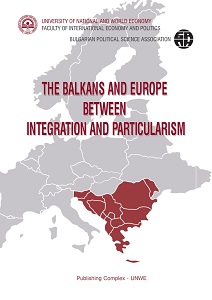
Historically the European Union was relatively successful, especially for the original purpose of ensuring peace in Europe. Nowadays, however, many of the stakeholders, particularly from within, are becoming increasingly critical of the Union calling into question its future. The purpose of this research is to provide an overview and analyse factors commonly perceived as indicative of the decline of the European Union with an attempt at distinguishing between causes and consequences and singling out factors underlying current internal tensions. The findings suggest that the fundamental cause of struggle lies in the enlargements of 1985 and the ones that occurred after 2000. The acceptance of new members not sufficiently aligned regarding both the economy and political culture resulted in growing internal tensions, which escalated further in the face of additional pressures such as the financial and the refugee crises. Structural weakness and inability to organise democratic process at European level has made the accommodation of new members more problematic.
More...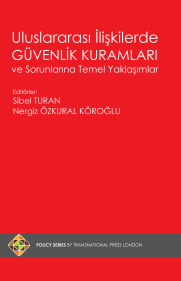
Bu çalışma, Kenneth Waltz tarafından ortaya konulan Neorealist yaklaşımın uluslararası sistemin temel özelliklerine ilişkin varsayımları bağlamında, 1945-1965 yılları arasında Türk dış politikasının temel parametrelerini incelemeyi amaçlamaktadır. Çalışmada, İkinci Dünya Savaşı'nın hemen ardından ortaya çıkan iki kutuplu sistemin, Türk dış politikası üzerinde belirleyici bir etkisinin bulunup bulunmadığı sorusuna cevap aranmaktadır. Çalışmanın hipotezi şu şekilde formüle edilmiştir: Kenneth Waltz tarafından geliştirilmiş olan Neorealist yaklaşımın uluslararası sistemin temel özelliklerine ilişkin varsayımları dikkate alındığında, iki kutuplu sistem, bilhassa 1945-1965 yılları arasında Türk dış politikası üzerinde belirleyici bir etkide bulunmuştur.
More...
Bu çalışma, liberal kurama bağlı olarak İsrail ve Türkiye ilişkilerinin 21. yüzyıldaki durumunun değerlendirilmesini amaçlamıştır. Liberal kuramın güvenliğe bakışına dayanarak, iki ülke arasındaki ilişkilerin güvenlik yaklaşımını nasıl şekillendirdiği açıklanmaya çalışılmıştır. Klasik Liberalizmin küresel güvenlik ve barış yorumu, İsrail ile Türkiye arasındaki ilişkilerin tekrar değerlendirilmesinde kullanılmıştır. Kısacası 21. Yüzyıldaki İsrail ve Türkiye güvenlik algısının liberal kurama dayalı yorumlanması sunulmuştur.
More...
Uluslararası İlişkiler disiplini, Siyaset Bilimi’nin bir dalı olarak, devletler ya da uluslararası-uluslarüstü kuruluşların davranışlarına yönelik araştırmalar yapmaktadır. Hedeflerinden biri; savaş, çatışma, güvenlik vb. konuları yerel-bölgesel-küresel ölçeklerde analiz etmek ve genel çıkarımlar sunmaktır. Bu işlevi gerçekleştirirken çeşitli hipotezler kurgulanmakta-sınanmakta, farklı farklı kuramlar kullanılmaktadır. Rusya’nın Kırım’ı ilhakı, Kuzey Kore’nin füze denemeleri, yumuşamaya başlayan Küba-ABD ya da yumuşamış İran-Batı ilişkileri gibi herhangi bir uluslararası ilişkiler gelişmesinin teorik olarak çerçevelenmesi, konunun bilimsel bir yapıda irdelenmesi anlamı taşımaktadır. Bu da ilgili kişilerin ilintili konuları okuma yeteneğini arttırmakta, böylece örneğin daha doğru devlet politikalarının oluşmasına katkı vermektedir.
More...
Suriye’de yaşanan iç savaşın neden olduğu mülteci krizi, son dönemde Türkiye-Avrupa Birliği (AB) ilişkilerinin gidişatını önemli derecede etkileyen bir gelişme olarak ön plana çıkmaktadır. Bu durumun temel nedeni; söz konusu krizin Türkiye ile AB arasında imzalanan Geri Kabul Anlaşması (GKA) ve buna paralel olarak başlatılan vize serbestliği diyaloğunun yanı sıra üyelik müzakerelerinde yeni fasılların açılması konusunda da belirleyici olmasıdır. Bu çerçevede, esasında Türkiye-AB ilişkilerinden bağımsız olarak ele alınabilecek olan Suriyeli mülteci krizine karşı taraflarca etkin bir çözüm üretilememesi, gelinen son aşamada söz konusu krizin Türkiye ile AB arasında bir pazarlık unsuru haline gelmesine neden olmuştur. Taraflar arasında konuyla ilgili yürütülen müzakereler bu nedenle stratejik bir nitelik kazanmaktadır.
More...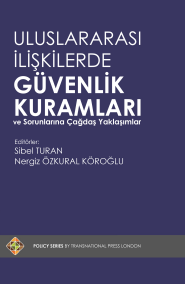
Barış ve savaş kavramları uluslararası ilişkilerde çok uzun zamandır tanımlanmaya çalışılan kavramlardır. Ancak barış kavramı en çok İkinci Dünya Savaşı sonrasında daha sistemli bir şekilde çalışılmaya başlanmıştır. Barış çalışmaları literatüründe üç temel barış tanımı öne çıkmaktadır. Bunlar; John Burton’ın “ihtiyaç teorisine göre barış”, Johan Galtung’un barışçıl yollarla barış yaklaşımında ortaya koyduğu “negatif barış”-“pozitif barış” ayrımı ve Kenneth Boulding’in “istikrarlı/sürdürülebilir barış” kavramlarıdır. Günümüzde barış çalışmaları sadece tarafları masaya oturtmaktan ibaret değildir. Tarafların çatışma sebepleri etraflıca değerlendirilmelidir. Çatışma çözümü, çatışan taraflar arasındaki şiddeti önlemeyi veya hafifletmeyi amaçlar. Barışı sağlamak ve çatışmayı önlemek için müzakere ve arabuluculuk gibi yöntemler vardır. Günümüz barış çalışmalarında; sosyal değişim, adalet ve yapısal şiddetin azaltılması gibi pozitif barışla ilgili kavramlar vurgulanmaktadır. Barış çalışmalarında taraflar arasında askeri, siyasal güç dengelerinin ve güvenlik kaygılarının önemsenmesi gereklidir. Aksi halde bir barış anlaşması yapılsa da hayata geçirilememektedir. Bu duruma İsrail-Filistin arasındaki Oslo Barış Görüşmeleri iyi bir örnek olarak gösterilebilir.
More...
11 Eylül 2001 olayları sonrasında yoğun olarak terörizm ile birlikte tartışılan göç ve göçmen kavramları, Arap Baharı olarak adlandırılan süreçten bu yana yeniden ülkelerin öncelikli politika konuları arasında yer almaya başladı. Özellikle Avrupa Birliği üye ülkelerinde yaşanan peş peşe terör saldırıları ilgiyi yine “diğerlerine” çevirmiş, göçmenler güvenlikle ilgili politik söylemlerin hedefi haline gelmiştir.
More...
Soğuk Savaşın çözülme sürecinde güvenlik kavramını yeniden tanımlamaya yönelik çalışmalarda kayda değer artış gözlendi. Bu bağlamda, Eleştirel Güvenlik düşüncesi de Soğuk Savaş sonrası dünyayı anlamada yetersiz kaldığı düşünülen Geleneksel Güvenlik akımlarına tepki olarak ortaya çıktı. Eleştirel Güvenlik yaklaşımının ortaya çıkışı, ana-akım Uluslararası İlişkiler teorilerindeki tartışma süreçlerinden bağımsız değildir. Eleştirel Güvenlik düşüncesi, 1980’lerde Uluslararası İlişkiler disiplinindeki Neo-Realist hegemonyaya karşı başlatılan Eleştirel karşı duruşun bir ürünüdür. Dolayısıyla, Eleştirel Güvenlik Çalışmaları (Critical Security Studies-CSS) güvenlik çalışmalarını Eleştirel Teori ile iliş-kilendirmeyi amaçlayan bir yaklaşım olarak ortaya çıkmıştır.
More...
1990 Soğuk Savaş sonrasında uluslararası ilişkilerde ve sistemde yaşanan değişim güvenlik kavramına yönelik tanımlanmaları ve çalışmalarını da etkilemiştir. Güvenliğin ajandası genişlemiş ve bu bağlamda devlet ve devlet dışı aktörler güvenlik tartışmasında öne çıkmıştır. Dünya kamuoyu güvensizlikleri anlamada yetersiz kalmış, popüler olan ulusal güvenlik yaklaşımı yerine uluslararası/küresel güvenlik yaklaşımları tartışılmaya başlanmıştır. Bu minvalde uluslararası ilişkiler teorilerinin de çeşitlendiği bir gerçektir. Özellikle iki bloklu yapının (Batı ve Doğu) ortadan kalkmasıyla çok boyutlu ve aktörlü küresel sistemle devletlerin tehdit tanımlamaları da farklılaşmıştır. Bu süreçte salt siyasi/askeri ittifakların yetersizliğinden hareketle devletlerin ekonomik, sosyal ve çevresel alanlarda da işbirliği içerisinde olmaları gereklilik halini almıştır. Nitekim küreselleşmenin etkisiyle birlikte devletlerin güvenliğinden ziyade toplum ve bireylerin güvenlik kaygıları öncelenmiş ve devletlerle daha bağlılık taşımıştır. Dolayısıyla geleneksel güvenlik anlayışı yerine gündemi ve aktörleri genişleyen yeni bir güvenlik anlayışı ortaya çıkmıştır.
More...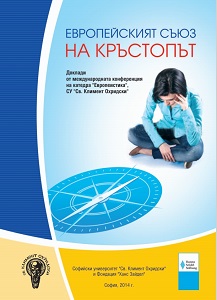
Robert Schuman’s call from 1958 for a community of peoples in freedom, equality, solidarity and peace and which is deeply rooted in Christian basic values comes to mind when looking at the contemporary European stage today, to the phases of changes and challenges Europe is going through. A paradoxical Europe may appear to one’s sight, a civilization that lost track of itself and knows no longer what it stands for, swept in various crises, culminating with a crisis of identity manifesting itself at different levels, including the economic and political ones. The question of the European identity seems to have aquired a more complex dimension with the efforts to formulate a Treaty Establishing a Constitution for Europe (2004) but also in the context of the enlargement that brought with itself new challenges and intensified the struggle to integrate different religious and secular communities. This reveals once again that providing an answer to the question ‘What is Europe?’ is still provocative for the 21st century Europe. A heir of the Greek, Roman and Judeo-Christian heritage, contemporary Europe seems to be in a state of confusion when it comes to recognizing its religious roots.
More...